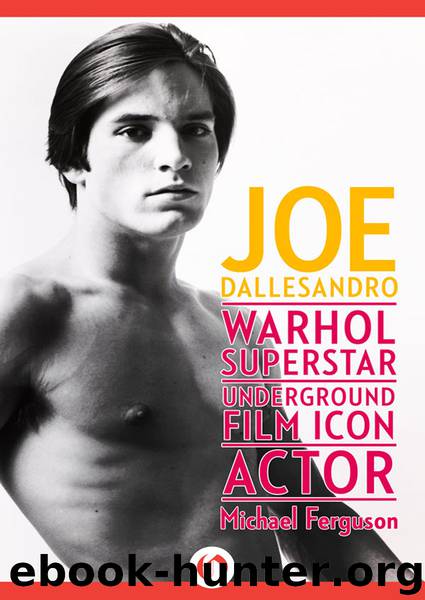Joe Dallesandro by Michael Ferguson

Author:Michael Ferguson
Language: eng
Format: epub
ISBN: 9781504006545
Publisher: Open Road Media
Courtesy of Joe Dallesandro
The aging actress (Sylvia Miles) and her callous young lover (Joe) in Heat. Levitt-Pickman/Photofest
HEAT (1972)
(CALORE; HOLLYWOOD; ANDY WARHOL’S HEAT; CALIENTE)
Joe Dallesandro (Joey Davis), Sylvia Miles (Sally Todd), Andrea Feldman (Jessica), Pat Ast (Lydia, the motel owner), Ray Vestal (Ray, the producer), Lester Persky (Sidney), Eric Emerson (Eric), Gary Koznocha (Gary), Harold Childe (Harold), Pat Parlemon (girl by pool), Bonnie Walder/Glick (Bonnie, Jessie’s girlfriend), John Hallowell (John, the gossip columnist). Directed by Paul Morrissey. 101 minutes
“In my movies, everyone’s in love with Joe Dallesandro.”
—Andy Warhol
The third installment in what has become known as Morrissey’s Trilogy is also the closest the director came to making a Hollywood-style feature during this period. Flesh has its herky-jerky style. Trash has its gutter inspiration and close-ups of Joe shooting up. But Heat’s conventional storyline, perhaps even its Southern California locale, gives it a significantly different feel. It’s not an underground film, but a very funny low-budget comedy with a host of weird and memorable characters.
Just prior to Heat, Morrissey and Warhol had lensed two of their “women’s” pictures and there was no place for Joe in either. First was Women in Revolt (P.I.G.S; 1971), a send-up of women’s lib starring Jackie Curtis, Candy Darling, and Holly Woodlawn as Politically Involved Girls. Then L’Amour (Beauties; 1972), a $100,000 feature shot in Paris detailing the relationships of three American girls in the city of love. The story swirls a great deal around the subject of toilets and the deodorant cakes used in urinals.
The decision was made to shoot a film in Europe to capitalize on all of their international success there. Morrissey said at the time that Joe didn’t join the cast in Paris because “he’s a very quiet type of person and if there’s a lot of people in the scene he won’t compete; he’ll just clam up. He only speaks when he has to. I think this is very good because I think this is, you know, the tradition in men’s acting on the screen—like John Wayne; you only speak when necessary.”
That’s also something of a misnomer. Joe’s reputation for not speaking much in his films is hardly confirmed by watching the films themselves. I think that this perception—one which I shared for quite some time—is skewed by how otherwise “normal” Joe’s characters often appear when surrounded by flamboyant, larger-than-life, and very talkative characters. By comparison, he seems subdued and silent. He’s certainly not the latter. But even when he decides not to vocalize, Joe ends up saying a hell of a lot, as Morrissey would be the first to acknowledge and his camera attests. We experience the films largely through Joe’s characters in preference to the other outrageous personalities. He’s a consummate reactor, and we discover all sorts of information about him and about the other players just by keeping our eyes on him. I’ve no doubt he would have contributed greatly to both Women in Revolt and L’Amour had they decided to include him.
In Heat, as in all of his
Download
This site does not store any files on its server. We only index and link to content provided by other sites. Please contact the content providers to delete copyright contents if any and email us, we'll remove relevant links or contents immediately.
Call Me by Your Name by André Aciman(18953)
Ready Player One by Cline Ernest(12828)
How to Be a Bawse: A Guide to Conquering Life by Lilly Singh(6686)
Wiseguy by Nicholas Pileggi(4582)
The Kite Runner by Khaled Hosseini(4416)
On Writing A Memoir of the Craft by Stephen King(4205)
The Crown by Robert Lacey(4099)
Audition by Ryu Murakami(4091)
Call me by your name by Andre Aciman(4065)
Harry Potter and the Cursed Child: The Journey by Harry Potter Theatrical Productions(3954)
Gerald's Game by Stephen King(3913)
The Perils of Being Moderately Famous by Soha Ali Khan(3781)
Dialogue by Robert McKee(3576)
Dynamic Alignment Through Imagery by Eric Franklin(3482)
Apollo 8 by Jeffrey Kluger(3196)
How to be Champion: My Autobiography by Sarah Millican(3181)
Seriously... I'm Kidding by Ellen DeGeneres(3098)
Darker by E L James(3086)
History of Dance, 2E by Gayle Kassing(2997)
